-
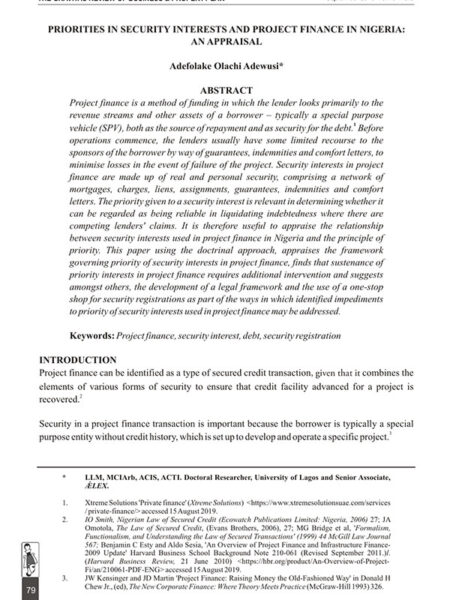
Priorities in Security Interests and Project Finance in Nigeria: An Appraisal
0₦2,500.00Adefolake Adewusi, Doctoral Researcher, University of Lagos and Senior Associate at ǼLEX in her article, Priorities in Security Interests and Project Finance in Nigeria: An Appraisal, posits that security interests in project finance are made up of real and personal security, comprising a network of mortgages, charges, liens, assignments, guarantees, indemnities and comfort letters. The priority given to a security interest is relevant in determining whether it can be regarded as being reliable in liquidating indebtedness where there are competing lenders’ claims. Adefolake appraises the framework governing priority of security interests in project finance, finds that sustenance of priority interests in project finance requires additional intervention and suggests the development of a legal framework and the use of a one-stop shop for security registrations as part of the ways in which identified impediments to priority of security interests used in project finance may be addressed.
-
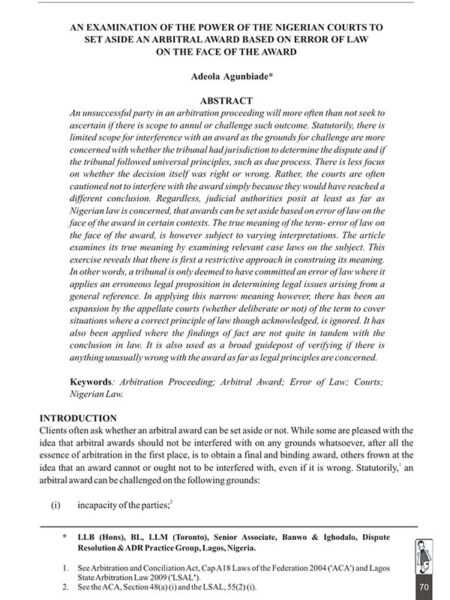
An Examination of the Power of the Nigerian Courts to Set Aside an Arbitral Award Based on Error of Law on the Face of the Award
0₦2,500.00Adeola Agunbiade, Senior Associate at Banwo & Ighodalo, Lagos Nigeria in An Examination of the Power of the Nigerian Courts to Set Aside an Arbitral Award Based on Error of Law on the Face of the Award argues that there is a limited scope for interference with an award as the grounds for challenge are usually whether the tribunal had jurisdiction to determine the dispute and if the tribunal followed universal principles, such as due process. There is less focus on whether the decision itself was right or wrong. However, courts can set aside an arbitral award based on an error of law on the face of the award. Adeola examines the true meaning of the term in the context of various judicial authorities.
-
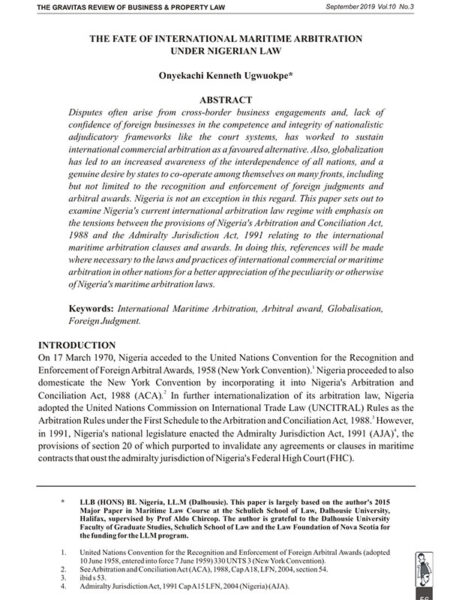
The Fate of International Maritime Arbitration under Nigerian Law
0₦2,500.00Onyekachi Ugwuokpe in his article, The Fate of International Maritime Arbitration Under Nigerian Law, dabbles into the exciting debate about the uncertainty of international maritime arbitration in Nigeria. While section 34 of the Arbitration and Conciliation Act (ACA) 1988 (modelled on the UNCITRAL Model Law on International Commercial Arbitration 1985) forbids Nigerian courts from intervening in any arbitral matter except as allowed under the Act, section 20 of the Admiralty Jurisdiction Act (AJA) 1991 invalidates any contractual provision that ousts the jurisdiction of Nigerian courts in the circumstances listed in the section. Onyekachi, in his usual inimitable style, goes to town, comprehensively reviewing judicial cases and learned commentaries and concluding that there is indeed a lacuna awaiting judicial clarity.
-
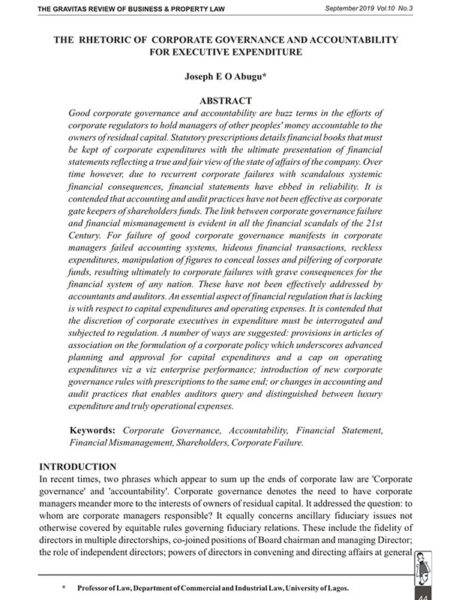
The Rhetoric of Corporate Governance and Accountability for Executive Expenditure
0₦2,500.00Joseph Abugu, Professor of Industrial and Commercial Law, University of Lagos in his article, The Rhetoric of Corporate Governance and Accountability for Executive Expenditure, argues that though financial statements of companies should reflect a true and fair view of their state of affairs, recurrent corporate failures have affected the credibility of financial statements. He posits that hideous financial transactions by corporate executives, reckless expenditures and manipulation of figures to conceal losses and pilfering are the failure of good corporate governance. He suggests ways by which the discretion of corporate executives in expenditures can be interrogated and subjected to regulation.
-
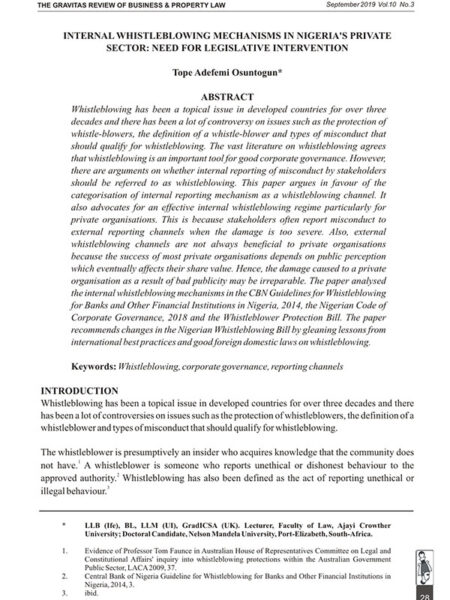
Internal Whistleblowing Mechanisms in Nigeria’s Private Sector: Need for Legislative Intervention
0₦2,500.00Tope Osuntogun of the Faculty of Law, Ajayi Crowther University, Oyo Nigeria, in her article, Internal Whistleblowing Mechanisms in Nigeria’s Private Sector: Need for Legislative Intervention makes a case for the categorisation of internal reporting mechanism as a whistleblowing channel while positing that whistleblowing is an effective tool for combatting corporate fraud. She comprehensively reviews Nigeria’s regulatory framework for whistleblowing in the private sector including a review of the Investment and Securities Act 2007, the Central Bank of Nigeria Act 2007, the CBN Guidelines for Whistleblowing for Banks and Other Financial Institutions in Nigeria 2014, and the Nigerian Code of Corporate Governance 2018.
-
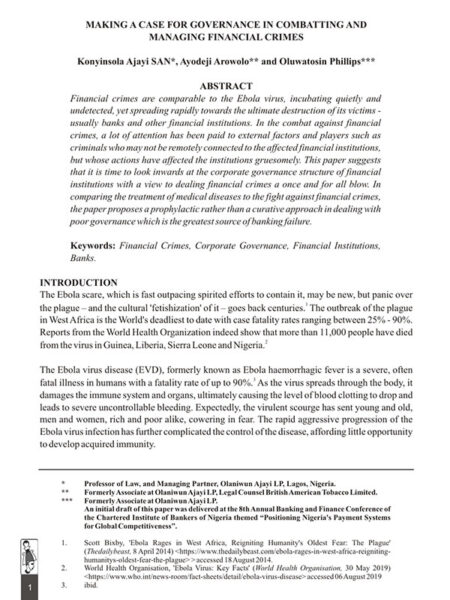
Making a Case for Governance in Combatting and Managing Financial Crimes
0₦2,500.00Professor Konyinsola Ajayi, SAN of Olaninwun Ajayi LP, Ayodeji Arowolo of British American Tobacco and Oluwatosin Phillips in their article, Making a Case for Governance in Combatting and Managing Financial Crimes compare financial crimes to a devastating disease, which incubates quietly and undetected, yet spreads rapidly towards the ultimate destruction of its victims. They argue that while advancement in IT has driven economic growth and financial inclusion, banks have become hosts for financial crimes. While considering judicial attitude to bank frauds, they conclude that just as a prophylactic treatment of diseases is preferred to curative treatment, good corporate governance in financial institutions will rein in financial crimes.
-
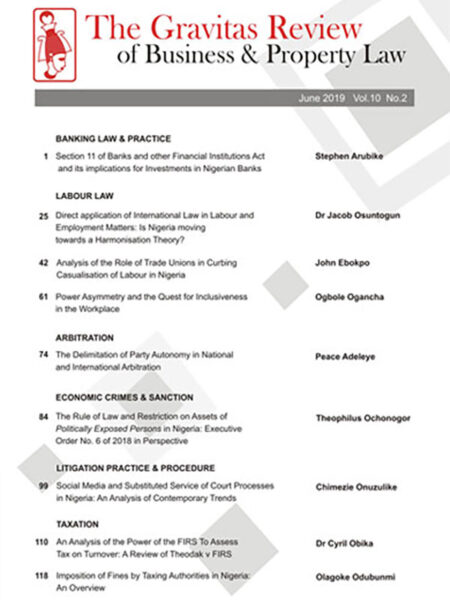
The Gravitas Review of Business & Property Law Vol.10 No.2 – Print
0₦5,000.00In this issue of The Gravitas Review of Business & Property Law Vol.10 No.2, there are well researched articles on:
- Banking Law & Practice
- Labour Law
- Arbitration
- Economic Crimes & Sanction
- Litigation Practice & Procedure
- Taxation
-

The Gravitas Review of Business & Property Law Vol.10 No.2 – E-Book
0₦5,000.00In this issue of The Gravitas Review of Business & Property Law Vol.10 No.2, there are well researched articles on:
- Banking Law & Practice
- Labour Law
- Arbitration
- Economic Crimes & Sanction
- Litigation Practice & Procedure
- Taxation
-

The Gravitas Review of Business & Property Law Vol.10 No.2
0₦5,000.00In this issue of The Gravitas Review of Business & Property Law Vol.10 No.2, there are well researched articles on:
- Banking Law & Practice
- Labour Law
- Arbitration
- Economic Crimes & Sanction
- Litigation Practice & Procedure
- Taxation
-
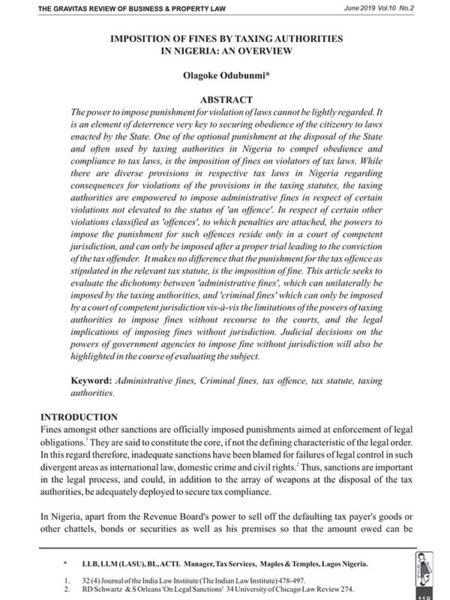
Imposition of Fines by Taxing Authorities in Nigeria: An Overview
0₦2,500.00Olagoke Odubunmi, Manager, Tax Services, Maples & Temples, Lagos Nigeria in his article, Imposition of Fines by Taxing Authorities in Nigeria: An Overview makes a distinction between ‘administrative fines’, which can unilaterally be imposed by a taxing authority, and ‘criminal fines’ which can only be imposed by a court of competent jurisdiction. He considers the legal implication of taxing authorities imposing fines without jurisdiction and concludes with a review of judicial authorities on the powers of government agencies in the imposition of ‘criminal fines’.
-
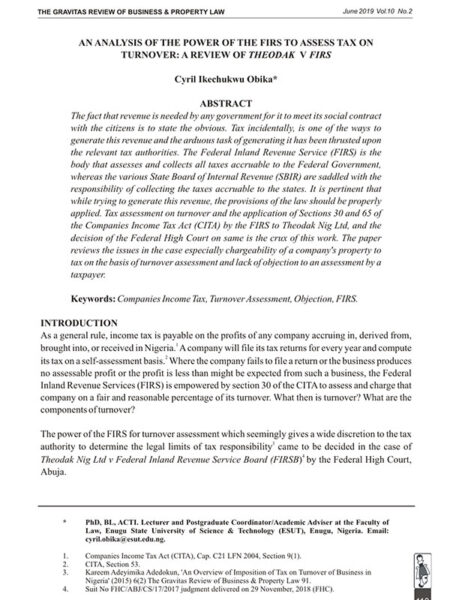
An Analysis of the Power of the FIRS to Assess Tax on Turnover: A Review of Theodak v FIRS
0₦2,500.00Dr Cyril Obika of the Faculty of Law, Enugu State University of Science & Technology, Enugu Nigeria in his article, An Analysis of the Power of the FIRS to Assess Tax on Turnover: A Review of Theodak v FIRS posits that ordinarily the FIRS, under section 9 of the Companies Income Tax Act 1961 as amended (CITA) charges to tax the profits of a company on its income> accruing in, derived from, brought into, or received in Nigeria. Exceptionally, under section 30 CITA the FIRS may charge a ‘fair and reasonable percentage’ of the turnover of a company to tax where there is no assessable profit or the profit is less than expected of such a business. Again, the FIRS under section 65 CITA may use its ‘best of judgment’ to assess tax where a company fails to file a return. Can the property of a company let to tenants be its turnover? Dr Obika examines the interrelation of sections 9, 30 and 65 of the CITA in his review of Theodak v FIRS.
-
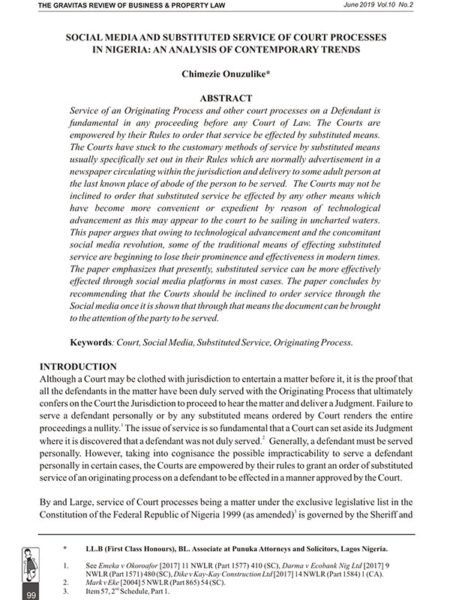
Social Media and Substituted Service of Court Processes in Nigeria: An Analysis of Contemporary Trends
0₦2,500.00Chimezie Onuzulike, Associate at Punuka Attorneys and Solicitors, Lagos Nigeria in his article, Social Media and Substituted Service of Court Processes in Nigeria: An Analysis of Contemporary Trends, peruses various High Court Rules and posits that despite the courts sticking to the customary methods of service by substituted means, normally advertisement in a newspaper circulating within the jurisdiction or delivery to some adult person at the last known place of abode of the person to be served, there may be room for substituted service through the social media. He argues that owing to technological advancement and the concomitant social media revolution, substituted service can be more effectively effected through social media platforms. He concludes that though a Nigerian court has blazed the trail, should be inclined to order service through the social media once it is shown that through that means the document can be brought to the attention of the party to be served.
The Gravitas Review of Business & Property Law



